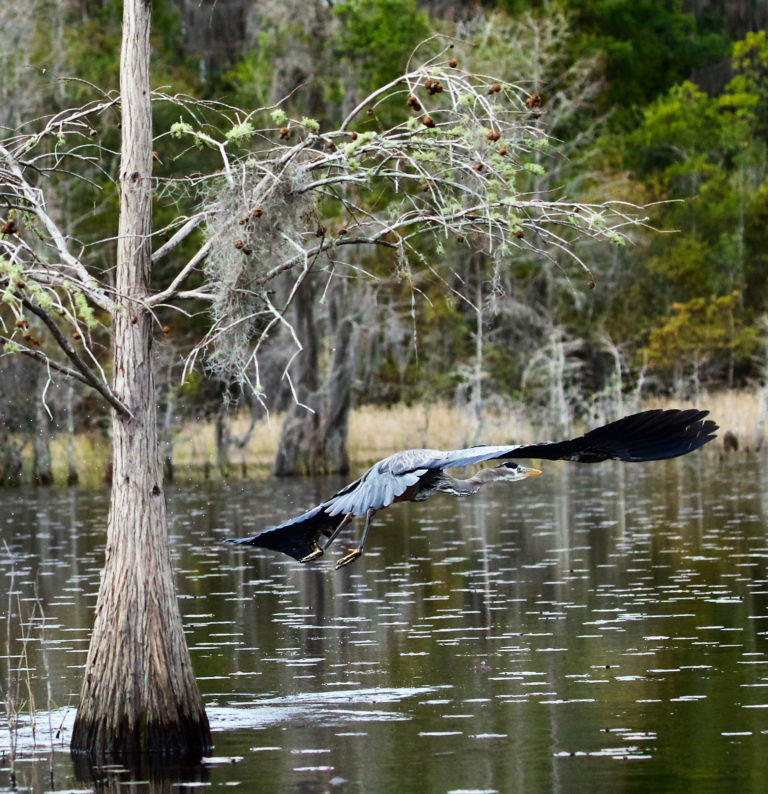
Today, you can take action to help Suwannee Riverkeeper protect Okefenokee Swamp and the surrounding community in Southern Georgia and northern Florida from the risk of dangerous mining pollution.
Okefenokee National Wildlife Refuge is home to the beloved blackwater Okefenokee Swamp, a Wetland of International Importance and a proposed World Heritage Site. Okefenokee Swamp is an ecologically diverse wetland, loved by boaters, fishers, and birders, as well as alligators and blue herons, and hunters on nearby property. It’s an important tourist attraction for members of the public all across the country and provides great economic benefits to the local area. Suwannee Riverkeeper John S. Quarterman has helped lead the way in protecting this special place.
In 2019, Twin Pines Minerals LLC, an Alabama-based company, first proposed a titanium mine beside the swamp. Twin Pines’ proposed mine poses dangerous risks to the water quality and the environment in and around the wetland, including the potential to disrupt groundwater flow and drain the swamp, and release polluted water into the swamp. Since Okefenokee Swamp and the proposed titanium mine lie in the headwaters of the Suwannee and St. Marys Rivers, both of those rivers, their surrounding communities drinking water, and species like the endangered Atlantic Sturgeon and the threatened Gulf Sturgeon face the risk of dangerous pollution, too.
In addition, citing the United States Geological Survey and other research, Suwannee Riverkeeper John S. Quarterman has raised concern about dangers called “slimes,” or nanoparticles of mining sludge. Slimes can smother fish if spilled from containment ponds, as happened on sites in north Florida where Twin Pines was processing tailings, or the mineral waste from mining operations. Twin Pines has adequately addressed the issue of slimes at the proposed mine by Okefenokee Swamp, despite these issues at other mine sites.
Twin Pines has promised the community that their proposed mine will bring jobs to a county that sorely needs them, but community members do not have clear information about how many jobs will be available, how long they’ll last, nor have they been given commitments that the jobs will be set aside for the longtime citizens of the county who most need them.
We last urged our supporters to write public comments about the mine’s dangerous risks to the Army Corps of Engineers in May 2020, in the company of countless other environmental groups and even government agencies and officials who’ve voiced opposition to the project; former EPA Region 4 Administrator Mary Walker and officials from the U.S. Fish and Wildlife Service (FWS) wrote letters of opposition in 2019, calling out the project’s “substantial risk” to the environment.
Unfortunately, in October 2020, the Army Corps ruled that the swamp is not under the Trump Administration’s changes to the “Waters of the United States” (WOTUS) rule, which radically minimizes the waterways protected by the Clean Water Act, which the Corps relied on to exclude wetlands at the site of the proposed mine from Clean Water Act protections. The Biden Administration is likely to change the “WOTUS” rule again, but not soon enough to protect the Okefenokee Swamp, which effectively puts the decision in the hands of the state of Georgia.
The Army Corps’ abdication of responsibility over the waters at the site may also have been unreasonable under the law. Suwannee Riverkeeper has noticed some possible discrepancies that should be further investigated by the agency and the Georgia Environmental Protection Division. Additionally, the Corps did not consider what would happen if the mine continued north on the miners’ property, which, as the U.S. Fish and Wildlife Service previously pointed out, extends to “a half mile from the refuge boundary and 400 feet from the edge of the Okefenokee Swamp.”
Steve Ingles, president of Twin Pines, acknowledged his two-year lobbying campaign of over $300,000 to lobbying firms on behalf of his project up until the very day before the Army Corps decision, but said he had not influenced politicians in an article by reporter Nedra Rhone in the Atlanta Journal-Constitution. The same piece included background information on Steve Ingles’ past projects and other business:
“Twin Pines has been cited for environmental violations in Florida, for its operations with the Chemours Co., which included unauthorized discharges into the wetlands and not having a mitigation plan in place. Ingle is also at the helm of Green Fuels Energy LLC, which owns Georgia Renewable Power, a company that operates a pair of biomass facilities in rural Georgia that have been cited for violations by state regulators. The facilities were also the target of recent legislation to prevent burning of toxic rail ties.”
The proposed mine’s future — and the Okefenokee Swamp and surrounding communities’ future — now lies in the hands of the state of Georgia, but your words can make a difference!